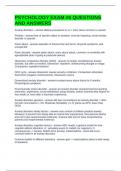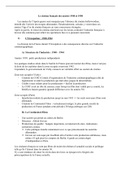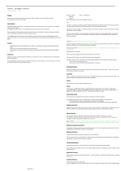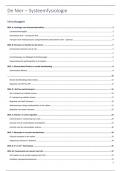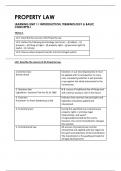PSYCHOLOGY EXAM #6 QUESTIONS
AND ANSWERS
Anxiety disorders - answer-lifetime prevalence in us = 18%. More common in women
Phobias - answer-fear of specific object or situation, must be impairing, social anxiety
disorder vs specific
Panic attack - answer-episodes of intense fear and terror, physical symptoms, and
unexpected
Panic disorder - answer-panic attack, worry about attack, common co-morbidity with
agoraphobia (fear of going to particular places)
Obsessive compulsive disorder (OCD) - answer-no longer considered an anxiety
disorder, but often co-morbid. Obsession: repetitive, unwelcoming thought or image.
Compulsion: repetitive behavior
OCD cycle - answer-obsession causes anxiety or distress. Compulsion eliminates
discomfort (negative reinforcement). Obsession returns.
Generalized anxiety disorder - answer-constant worry about future for 6 months.
Physiological symptoms.
Post-traumatic stress disorder - answer-an anxiety disorder characterized by haunting
memories, nightmares, social withdrawal, jumpy anxiety, and/or insomnia that lingers for
four weeks or more after a traumatic experience.
Anxiety disorders genetics - answer-MZ twin concordance for anxiety disorder = 40%.
DZ twin concordance = 4%. Moderate heritability (.3-.5) [same as APD, lower than
OCD]
Anxiety disorders family factors - answer-over control of children predicts anxiety.
Monkeys: if prevent from being able to control their experiences, they become fearful
and can't cope (experimental evidence). Anxious kids tend to have overprotective
parents (non-experimental evidence)
Anxiety disorders cognitive factors - answer-ABC model: a general model for how
cognition affects disorders. A - activating event. B- beliefs (or cognition). C-
consequences -> anxiety. Beliefs drive anxiety. Catastrophize - worst will occur,
common belief in all anxiety disorders
Common beliefs in different disorders - answer-gad -> catastrophize about a wide range
of situations
, Social phobia -> a lot of people are watching and judging
Panic disorder -> misinterpret symptoms as disorder (i.e. Heart pound = heart attack
then belief increases symptoms)
OCD -> i need 100% assurance that bad things won't happen, but we don't have control
over everything
Anxiety disorders learning - answer-1. Classical conditioning -> origin of anxiety
disorders (little albert)
2. Modelling -> origin of anxiety disorders. Haven't experienced it but still anxious.
Observe other being fearful or experience a bad outcome. Anxious parents have
anxious kids
3. Operant conditioning -> perpetuating cause of anxiety disorders. Behavior that
reduces anxiety provides negative reinforcement. Thus avoidance means no extinction
occurs
Compliance - answer-a change in behavior or attitude as a result of a request from
another person
Cognitive dissonance - answer-a state of mental discomfort arising from a discrepancy
between two beliefs or between a person's beliefs and actions. Discomfort is
proportional to intensity and importance of the two beliefs. Discomfort must be alleviated
by changing belief
Festinger and carlsmith (1959) - answer-part 1: boring tasks. Part 2: request to life for
$1 or $20. Control is no lie. (lie was that the person enjoyed the boring tasks). Part 3:
questionnaire report "how much did you like the study tasks?" $1 people rated higher
because more cognitive dissonance (btw lying and honesty trait) due to a lack of
explanation for why they should lie leading to a shift in their belief regarding the task.
$20 people were payed well to lie so no cognitive dissonance.
Insufficient justification - answer-you engage in counter attitudinal behavior. You see
your behavior as freely chosen, but you don't have a clear justification for it. Feel
cognitive dissonance -> resolve inconsistency by changing belief to fit your behavior
("we come to love the things we suffer for" i.e. Hazing or boot camp)
Gal & rucker (2010) - answer-mrs. Keech and the seekers advocated for group more
when beliefs were threatened. World is going to end, but it didn't. Resolve cognitive
dissonance by supporting initial belief more strongly.
Belief in animal testing - answer-first iv: feeling affirmed (wrote about favorite things) or
control group (wrote about parents' favorite things).
Second iv: confident about beliefs about animal testing (wrote with dominant hand) or
doubtful (wrote with non-dominant hand).
Dv: number of words used to persuade someone about animal testing.
Confident: fewer words whether affirmed or control
Doubtful: more words for control condition than after affirmed.
AND ANSWERS
Anxiety disorders - answer-lifetime prevalence in us = 18%. More common in women
Phobias - answer-fear of specific object or situation, must be impairing, social anxiety
disorder vs specific
Panic attack - answer-episodes of intense fear and terror, physical symptoms, and
unexpected
Panic disorder - answer-panic attack, worry about attack, common co-morbidity with
agoraphobia (fear of going to particular places)
Obsessive compulsive disorder (OCD) - answer-no longer considered an anxiety
disorder, but often co-morbid. Obsession: repetitive, unwelcoming thought or image.
Compulsion: repetitive behavior
OCD cycle - answer-obsession causes anxiety or distress. Compulsion eliminates
discomfort (negative reinforcement). Obsession returns.
Generalized anxiety disorder - answer-constant worry about future for 6 months.
Physiological symptoms.
Post-traumatic stress disorder - answer-an anxiety disorder characterized by haunting
memories, nightmares, social withdrawal, jumpy anxiety, and/or insomnia that lingers for
four weeks or more after a traumatic experience.
Anxiety disorders genetics - answer-MZ twin concordance for anxiety disorder = 40%.
DZ twin concordance = 4%. Moderate heritability (.3-.5) [same as APD, lower than
OCD]
Anxiety disorders family factors - answer-over control of children predicts anxiety.
Monkeys: if prevent from being able to control their experiences, they become fearful
and can't cope (experimental evidence). Anxious kids tend to have overprotective
parents (non-experimental evidence)
Anxiety disorders cognitive factors - answer-ABC model: a general model for how
cognition affects disorders. A - activating event. B- beliefs (or cognition). C-
consequences -> anxiety. Beliefs drive anxiety. Catastrophize - worst will occur,
common belief in all anxiety disorders
Common beliefs in different disorders - answer-gad -> catastrophize about a wide range
of situations
, Social phobia -> a lot of people are watching and judging
Panic disorder -> misinterpret symptoms as disorder (i.e. Heart pound = heart attack
then belief increases symptoms)
OCD -> i need 100% assurance that bad things won't happen, but we don't have control
over everything
Anxiety disorders learning - answer-1. Classical conditioning -> origin of anxiety
disorders (little albert)
2. Modelling -> origin of anxiety disorders. Haven't experienced it but still anxious.
Observe other being fearful or experience a bad outcome. Anxious parents have
anxious kids
3. Operant conditioning -> perpetuating cause of anxiety disorders. Behavior that
reduces anxiety provides negative reinforcement. Thus avoidance means no extinction
occurs
Compliance - answer-a change in behavior or attitude as a result of a request from
another person
Cognitive dissonance - answer-a state of mental discomfort arising from a discrepancy
between two beliefs or between a person's beliefs and actions. Discomfort is
proportional to intensity and importance of the two beliefs. Discomfort must be alleviated
by changing belief
Festinger and carlsmith (1959) - answer-part 1: boring tasks. Part 2: request to life for
$1 or $20. Control is no lie. (lie was that the person enjoyed the boring tasks). Part 3:
questionnaire report "how much did you like the study tasks?" $1 people rated higher
because more cognitive dissonance (btw lying and honesty trait) due to a lack of
explanation for why they should lie leading to a shift in their belief regarding the task.
$20 people were payed well to lie so no cognitive dissonance.
Insufficient justification - answer-you engage in counter attitudinal behavior. You see
your behavior as freely chosen, but you don't have a clear justification for it. Feel
cognitive dissonance -> resolve inconsistency by changing belief to fit your behavior
("we come to love the things we suffer for" i.e. Hazing or boot camp)
Gal & rucker (2010) - answer-mrs. Keech and the seekers advocated for group more
when beliefs were threatened. World is going to end, but it didn't. Resolve cognitive
dissonance by supporting initial belief more strongly.
Belief in animal testing - answer-first iv: feeling affirmed (wrote about favorite things) or
control group (wrote about parents' favorite things).
Second iv: confident about beliefs about animal testing (wrote with dominant hand) or
doubtful (wrote with non-dominant hand).
Dv: number of words used to persuade someone about animal testing.
Confident: fewer words whether affirmed or control
Doubtful: more words for control condition than after affirmed.

